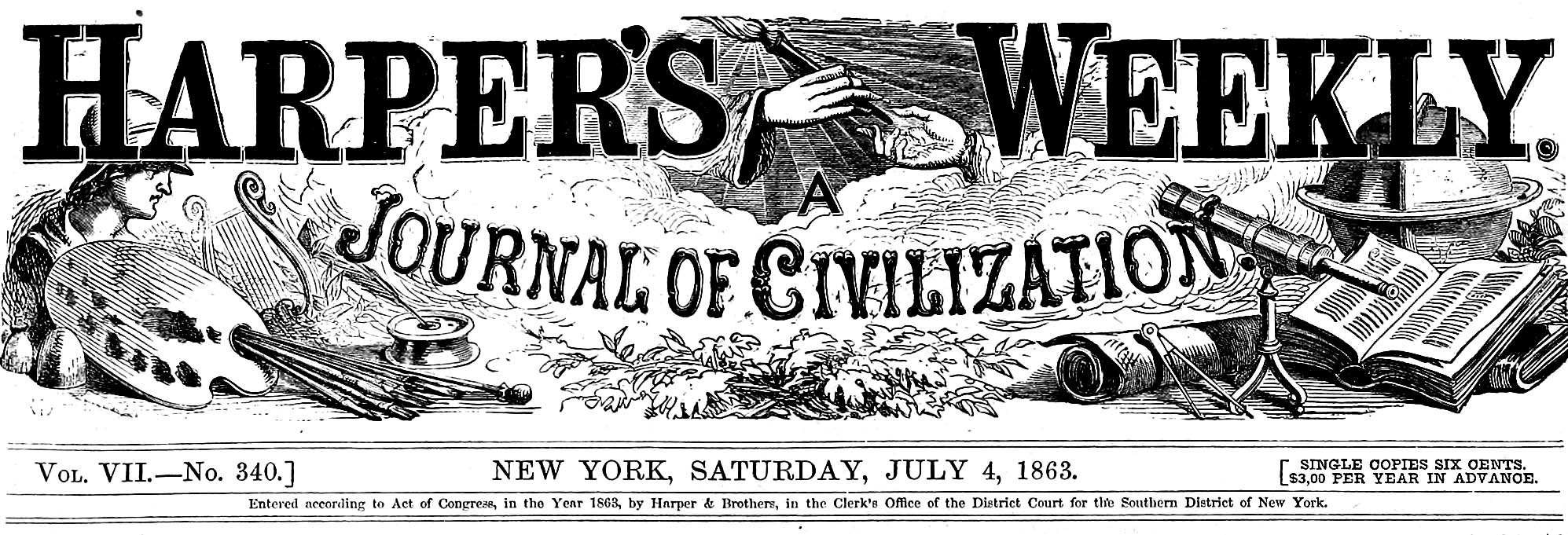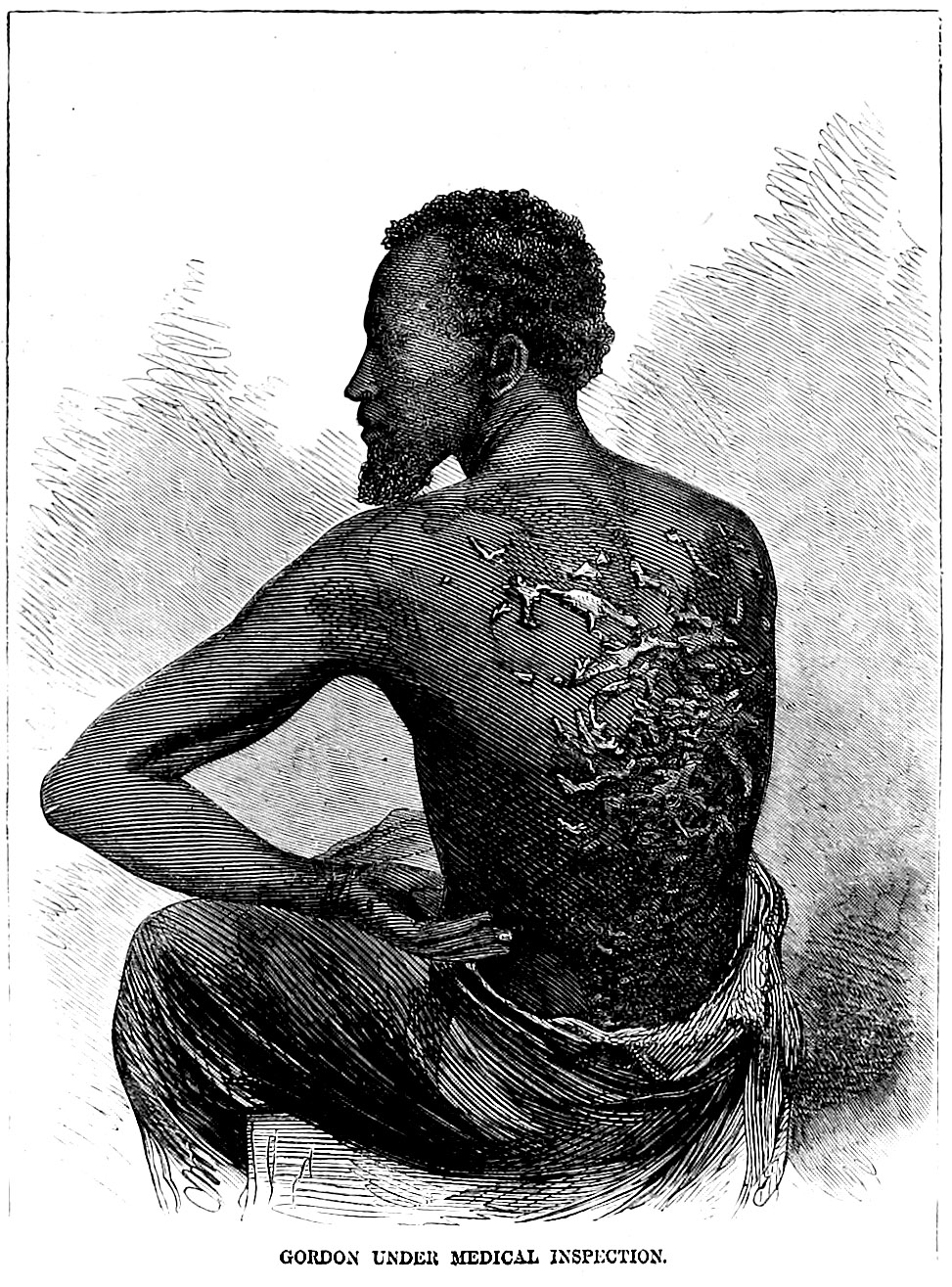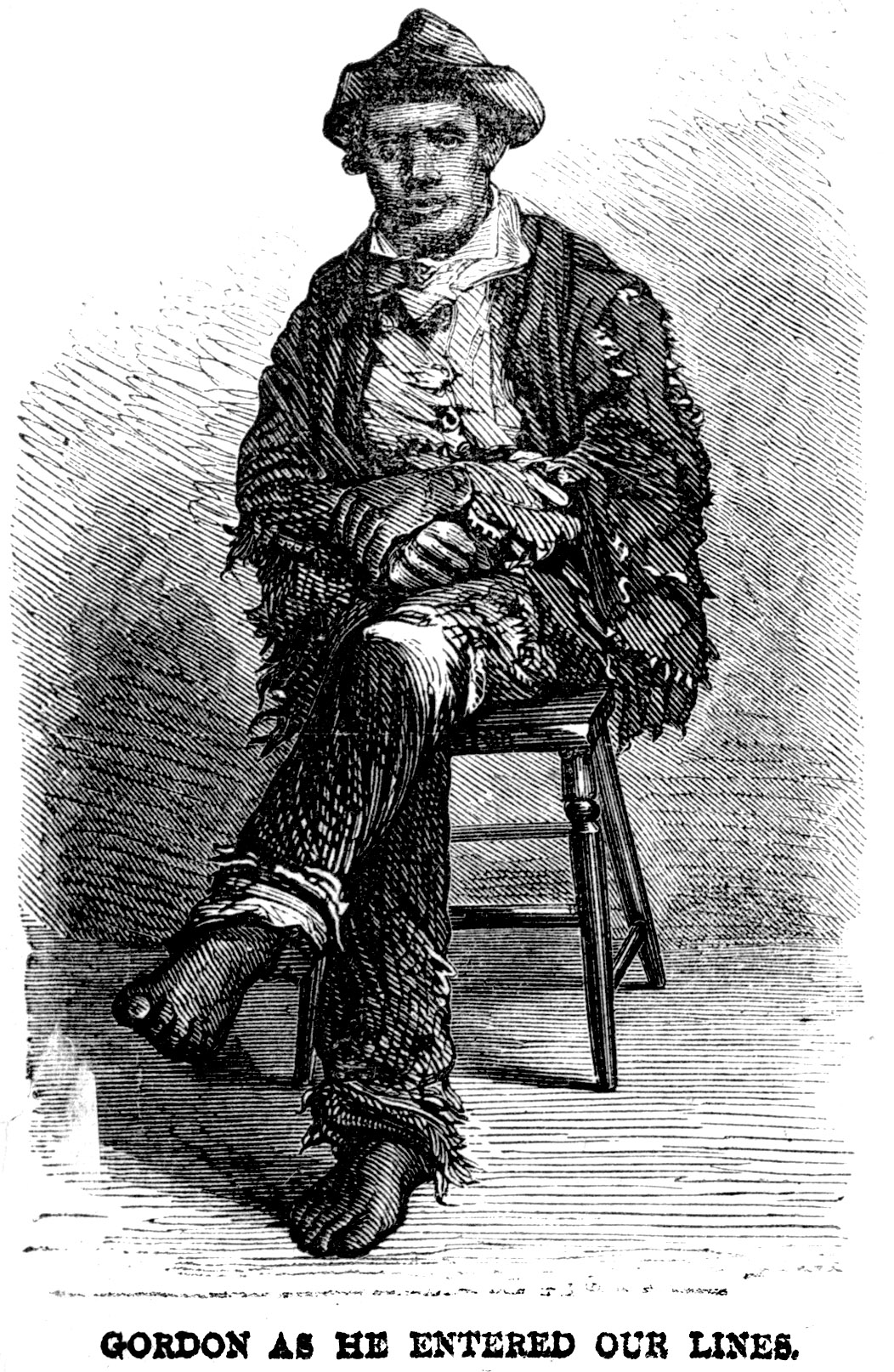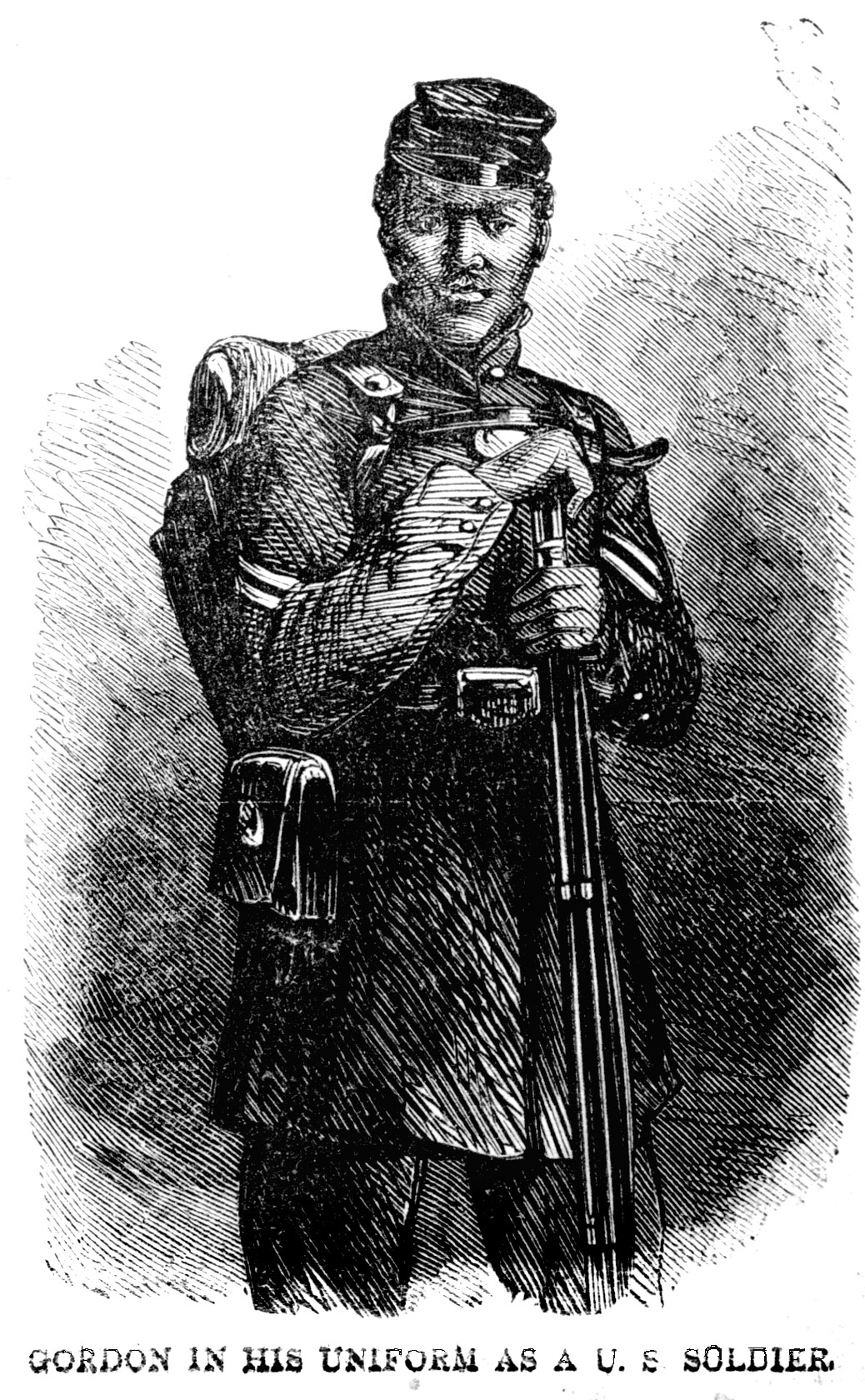Harper's Weekly, July 4, 1863.

A Typical Negro
WE publish herewith three portraits, from photographs by M'Pherson and Oliver, of the negro GORDON, who escaped from his master in Mississippi, and came into our lines at Baton Rouge in March last. One of these portraits represents the man as he entered our lines, with clothes torn and covered with mud and dirt from his long race through the swamps and bayous, chased as he had been for days and nights by his master with several neighbors and a pack of blood-hounds ; another shows him as he underwent the surgical examination previous to being mustered into the service —his back furrowed and scarred with the traces of a whipping administered on Christmas–day last; and the third represents him in United States uniform, bearing the musket and prepared for duty.

This negro displayed unusual intelligence and in order to foil the scent of the blood-hounds who were chasing him he took from his plantation onions, which he carried in his pockets. After crossing each creek or swamp he rubbed his body freely with these onions, and thus, no doubt, frequently threw the dogs off the scent.

At one time in Louisiana he served our troops as guide, and on one expedition was unfortunately taken prisoner by the rebels, who, infuriated beyond measure, tied him up and beat him, leaving him for dead. He came to life, however, and once more made his escape to our lines.

By way of illustrating the degree of brutality which slavery has developed among the whites in the section of country from which this negro came, we append the following extract from a letter in the New York Times, recounting what was told by the refugees from Mrs. GILLESPIE's estate on the Black River:
The treatment of the slaves, they say, has been growing worse and worse for the last six or seven years. Flogging with a leather strap on the naked body is common; also, paddling the body with a hand-saw until the skin is mess of blisters, and then breaking the blisters with the teeth of the saw. They have very often seen slaves stretched out upon the ground with hands and feet held down by fellow-slaves, or lashed to stakes driven into the ground for burning. Handfuls of dry corn-husks are then lighted, and the burning embers are whipped off with stick so as to fall in showers of live sparks upon the naked back. This is continued until the victim is covered with blisters. If in his writhings of torture the Slave gets his hands free to brush off the fire, the burning brand applied to them.
Another method of punishment, which is inflicted for the higher order of crimes, such as running away, or other refractory conduct, is to dig hole in the ground large enough for the slave to squat or lie down in. The victim is then stripped naked and placed in the hole, and covering or grating of green sticks laid over the opening. Upon this quick fire is built, and the live embers sifted through upon the naked flesh of the slave, until his body is blistered and swollen almost to bursting. With just enough of life to enable him to crawl, the slave is then allowed to recover from his wounds if he can, or to end his sufferings by death.
Charley “Sloo” and “Overton,” two hands, were both murdered by these cruel tortures. “Sloo” was whipped to death, dying under the infliction, or soon after punishment. “Overton” was laid nuked upon his face and burned as above described, so that the cords of his legs the muscles of the back refused longer to perform their office He was, nevertheless, forced into the field to labor, but being crippled, was unable to move quick enough to suit “Jeems”, so one day, in a fit of passion, he struck him on the head with heavy stick and killed him.
“Tom” had the consumption, but was forced to work in the cotton-field. One night he was missing from his cabin. Two days afterward his body was found in the field, where he had fallen and died on his way home.
“The poor old slave had gone to rest.“
Edmund, belonging on the Widow Gillespie's plantation has been a witness of or knowing to Several Cases of punishment by the burning process. Two of these were of girls belonging to the Widow G., in New Orleans, and the others occurring on her “island plantation,” before referred to.
America, wife of Essex, one of the women in the party, related to me the particulars of one as follows: There a middle-aged woman in the family, named Margaret, who had a nursing child. Mrs. Gillespie ordered Margaret to wean the child. The babe was weakly, and Margaret did not wish to do so. Mrs. G. told her that she would examine her breast the next Monday, and, if found any milk in it, she would punish her severely. Monday came round, and on that day Margaret's stent to spin eighteen &ldqu;Broaches” —spools— but she did not finish it. At night the promised examination took place, and the breast of Margaret gave but too convincing proof that, in obedience to the yearnings of a mother's heart, she had spurned the threat of the inhuman mistress. Mrs. G. then ordered the handsaw, the leather strap, and a wash-bowl of water. The woman was laid upon her face, her clothes stripped up to around her neck, and “Becky” and &lduo;Jane” were called to hold her hands and feet. Mrs. Gillespie then paddled her with the hand-saw, sitting composedly in a chair over her victim. After Striking some one hundred blows she changed to the use of the leather strap, which she would dip into the wash-bowl in order to give it greater power of torture. Under this infliction the screams of the woman died away to a faint moan, but the “sound of the whip” continued until nearly 11 0'clock. “Jane” was then ordered to bring the hot tongs, the wo was turned over upon her back, and Mrs. Gillespie attempted to grip the woman's nipples with the heated implement. The writhings of the mother, however, foiled her purpose; but between the breasts the skin and flesh were horribly burned.
During this terrible infliction “Jeems” came out of his room and remonstrated with his mother for “using the niggers so.” He “did not wish them punished in that way.” Her answer was, “They won't mind me, and I will do with them as I please.” Margaret was a long time in recovering from her wounds. Rose Ann, who was child's nurse, was sent upon one occasion to find and bring home a little boy named Tommy, whom his father had taken down town with him after breakfast. The child had been left at Mrs. Turner's, &lddquo;a grass-widow,” living in Camp Street, below Julia. It was found after a second hunt and brought home. Mrs. G. accused Rose of not trying to find the boy at first. She ordered her hands to be crossed and tied over her head; she was placed upon her back on the floor, her hands secured to the balusters and her feet to the extension table. In this position her person was exposed, the poker heated in the stove, and to make the punishment the more humiliating as well as most acute the hot instrument was applied to the most tender part of her body. She then gave her fifty lashes and let her loose. This horrible idiosyncrasy seemed to be a favorite method of torture with the widow. America, who related these facts to the writer, in the presence of several of her fellow-slaves, suffered a similar punishment on the plantation only few months since. She is seamstress, and had by mistake sewed in two sleeves of Mrs. G.'s daughter's dress the wrong way. For this offense she was laid upon a board upon a ladder, her hands and feet secured, and a leather strap and buckle tightly fastened around her Stomach and going under the ladder. Having previously placed the tongs in the fire, she ordered them brought and began pinching and burning her about the thighs, abdomen, and other parts until they were baked and stiff. This species of refined torture seemed to be a favorite one with her. On another occasion “America” says she was whipped with new “yellow cowhide” until her flesh ceased to feel the blows. Mrs. G. then brought a bottle of “No. 6,” and with a small sponge wet the lacerated parts with the fiery liquid, causing the most intense torture she ever experienced.
Edmund, Essex, and the rest assert that it was a very common thing to see a slave carried by force to the bedroom or the shed-room of Madame for punishment. She would order him to undress, and with her own hands apply the lash until she became exhausted.
A Typical Negro, Harper's Weekly Vol. VII, No. 340, New York, Saturday, July 4, 1863 Pages 429-430. (PDF)